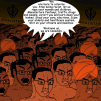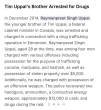Conservative party deputy leader Tim Uppal posted on social media on Wednesday morning, urging Sikhs to remember 1984.
“Forty one years ago, a pre-planned attack by the Indian army named Operation Blue Star was executed against one of the Sikh’s holiest places of worship, the Golden Temple, on one of the holiest days… Although intended to destroy the community, Sikhs have grown stronger over the years.”
It is not clear whether Uppal posted the reminder of an episode that inflames Khalistani separatists in spite of, or because of, remarks made by his former boss Stephen Harper at an event in Brampton, Ont. last weekend. The ex-prime minister urged all political parties to heed two points: firstly, that today more than ever, Canada needs a strong relationship with India; and, secondly, that any party that aspires to government must “sever its relations with those who seek bring the battle of India’s past to Canada.” While such people have the right to their democratic views, just as we tolerate those who want to break up Canada, we do not tolerate such views in parties that wish to govern the country, he said. When he was in government, his caucus understood this, he added. There was a sense in the pointed nature of his message that he does not think this is the case now in Pierre Poilievre’s Conservative party.
There are subtle signs of Sikh ascendancy.
Harper is said to have been asked by the Conservative campaign not to post any photos of himself and Indian Prime Minister Narendra Modi, during Harper’s visit to the sub-continent in February.
Hindus say they were upset by what they considered a weak response from Poilievre (and Liberal Leader Mark Carney) to the murder of 25 mainly Hindu tourists in Jammu and Kashmir during the election. The terrorists, thought to be Pakistan-linked Islamists, reportedly asked their victims their religion before shooting them. Neither Canadian leader mentioned India or that the victims were predominantly Hindu in their responses. There are Sikhs in positions of power in the Conservative party: Uppal is deputy leader and Jasraj Hallan is the finance critic. Uppal was a key Conservative responsible for reaching out to minority communities in the last election and the efforts left a heavy Sikh footprint.
Of 29 Indo-Canadian candidates appointed by the leader (or who ran in races where a leading contender was disqualified), it appears that 26 were Sikh. I tried to verify these numbers with Conservative party director of communications, Sarah Fischer and with Uppal, but neither replied by deadline.
Holy cow, National Post noticing Sihk ascendency in CPC. Just within the CPC, Ivison?In an interview with National Post, former two-time Conservative MP Devinder Shory asked rhetorically: “Could they not find any Christian, Muslim or Hindus from India?”
Former B.C. finance minister Mike de Jong was a casualty of the strategy to back Sikh candidates. He campaigned for a year to replace veteran Conservative MP Ed Fast in the B.C. riding of Abbotsford—South Langley. He had the backing of the riding association but days ahead of the federal campaign, he was told by the party that he was not approved to take part in the nomination contest because he was not qualified.
That race was eventually won by 25-year-old Sukman Gill, who went on to beat Liberal Kevin Gillies, as well as de Jong, who ran as an Independent.
This is the ultimate defence of appointing Sikhs: they tend to win. One Conservative veteran of outreach wars called the Sikh community “a vote-bank machine.”
The Indo-Canadian diaspora is split nearly 50/50 between Sikhs and Hindus, but the Sikh community is much more concentrated in a handful of ridings. There are nine ridings in Canada where the Sikh population makes up more than 20 per cent (including Surrey Newton in B.C., where it is over 50 per cent), according to the 2021 census. There are only two where Hindus account for more than one-fifth of the population.
Former prime minister Justin Trudeau’s Liberals were heavily criticized for pandering to the Sikh diaspora. Domestic politics were at least partly responsible for Trudeau’s decision to announce in the House of Commons in 2023 that Canada had “credible evidence” of Indian government involvement in the assassination of Khalistani activist, Hardeep Singh Nijjar.
Omer Aziz, a former Liberal foreign policy adviser to Trudeau, wrote in the Globe and Mail afterward that Canada should have clamped down on Khalistani terror financing but “didn’t want to lose the Sikh vote to (then NDP leader) Jagmeet Singh, so we dug in our heels.”
The truth is that all parties woo Sikh voters and, at best, turn a blind eye to Khalistani sympathizers.
The tactic worked for the Conservatives in the 2025 election, at least on the surface. The party added six new Sikh MPs to the caucus: Amanpreet Singh Gill in Calgary Skyview, Dalwinder Gill in Calgary McKnight, Jagsharan Singh Mahal in Edmonton Southeast, Sukman Gill in Abbotsford—South Langley, Amarjeet Gill in Brampton West and Harb Gill in Windsor West.
But there are opportunity costs to every move.
Anecdotally, it seems that many Hindus stuck with the Liberals, despite being upset over Trudeau’s behaviour on India.
Amarjeet Gill’s victory in Brampton West was the only success for the Conservatives in a riding where Hindus represented more than 10 per cent of the population.
But the implications of the strategy are wider than winning a handful or ridings.
Hindu Conservatives like Shory suggest, while Harper “kept everything in balance,” the Sikhs in caucus are now driving policy and that Khalistani sympathies are an obstacle to improving relations with India.
“Some people get the impression that politicians in Canada have been hijacked by Khalistanis. People have the right to express their views, but politicians should not give radicals their support. Canada should be in the forefront,” the former MP said.
De Jong said that he doesn’t understand why Canadian politicians allow themselves to get wrapped up in tribal politics.
“I’ve been doing this for a long time and I just didn’t go to certain parades because I didn’t want to march in front of a float that celebrated the assassination of an Indian prime minister (Indira Gandhi),” he said.
Poilievre has been clear in his speeches that new arrivals should bring their culture and their traditions here, but not their homeland conflicts.
“If you come to Canada, you become a Canadian. You put Canada first. Leave your problems at the door,” Poilievre said.
But that is not a philosophy he has applied to his own party’s nominations.
Upvote
12


